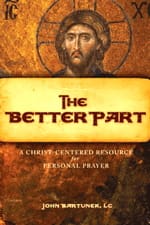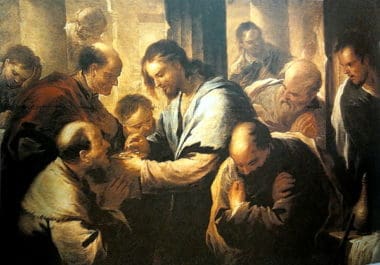“Do not, my child, approach Jesus Christ with the hope of bending his will to yours: what I desire is that you yield yourself to him and that he receive you, so that he, your Savior, may do with you and in you whatever he pleases.” – St. Cajetan
 John 6:60-71: After hearing it, many of his followers said, ‘This is intolerable language. How could anyone accept it?’ Jesus was aware that his followers were complaining about it and said, ‘Does this upset you? What if you should see the Son of Man ascend to where he was before? It is the spirit that gives life, the flesh has nothing to offer. The words I have spoken to you are spirit and they are life. But there are some of you who do not believe.’ For Jesus knew from the outset those who did not believe, and who it was that would betray him. He went on, ‘This is why I told you that no one could come to me unless the Father allows him.’ After this, many of his disciples left him and stopped going with him. Then Jesus said to the Twelve, ‘What about you, do you want to go away too?’ Simon Peter answered, ‘Lord, who shall we go to? You have the message of eternal life, and we believe; we know that you are the Holy One of God.’ Jesus replied, ‘Have I not chosen you, you Twelve? Yet one of you is a devil.’ He meant Judas son of Simon Iscariot, since this was the man, one of the Twelve, who was going to betray him.
John 6:60-71: After hearing it, many of his followers said, ‘This is intolerable language. How could anyone accept it?’ Jesus was aware that his followers were complaining about it and said, ‘Does this upset you? What if you should see the Son of Man ascend to where he was before? It is the spirit that gives life, the flesh has nothing to offer. The words I have spoken to you are spirit and they are life. But there are some of you who do not believe.’ For Jesus knew from the outset those who did not believe, and who it was that would betray him. He went on, ‘This is why I told you that no one could come to me unless the Father allows him.’ After this, many of his disciples left him and stopped going with him. Then Jesus said to the Twelve, ‘What about you, do you want to go away too?’ Simon Peter answered, ‘Lord, who shall we go to? You have the message of eternal life, and we believe; we know that you are the Holy One of God.’ Jesus replied, ‘Have I not chosen you, you Twelve? Yet one of you is a devil.’ He meant Judas son of Simon Iscariot, since this was the man, one of the Twelve, who was going to betray him.
Christ the Lord Why do many disciples leave Christ, while the Twelve stay with him? The question touches one of the great mysteries of our faith: human freedom. Somehow, in the depths of the human heart, God leaves us free to accept or reject the gift of faith. It always begins with God (“no one could come to me unless the Father allows him”), but the choice to stay or “leave” remains with each individual: “Do you want to go away too?” Jesus Christ is the Lord of life and history, but he refuses to impose his rule on hearts that want to “stop going with him” and return to their former way of life. God has given us the gift of life, but he leaves us free to administer it as we wish. In the Kingdom of Christ, there are no misanthropes.
 Christ the Teacher For the Christian, difficulties are opportunities. In the face of this “intolerable language,” Christ turns to his closest followers and invites them to make an explicit act of faith, to believe in him not because it makes perfect sense to do so, but simply because of who he is. He elicits their trust by assuring them that his words are “spirit and life,” but not by removing all obstacles from their understanding. (By saying, “It is the spirit which gives life, not the flesh,” he is not reneging on his assertion that his flesh is real food, just explaining how it can be living food.) For those who reassert their faith in him, trusting in him more than in their own understanding, this crisis becomes a milestone. Likewise, when we face moments of crisis, when the demands of faith outstrip the powers of understanding, we can either lean on ourselves and fall, or lean harder than ever on Christ and rise to the heights of love.
Christ the Teacher For the Christian, difficulties are opportunities. In the face of this “intolerable language,” Christ turns to his closest followers and invites them to make an explicit act of faith, to believe in him not because it makes perfect sense to do so, but simply because of who he is. He elicits their trust by assuring them that his words are “spirit and life,” but not by removing all obstacles from their understanding. (By saying, “It is the spirit which gives life, not the flesh,” he is not reneging on his assertion that his flesh is real food, just explaining how it can be living food.) For those who reassert their faith in him, trusting in him more than in their own understanding, this crisis becomes a milestone. Likewise, when we face moments of crisis, when the demands of faith outstrip the powers of understanding, we can either lean on ourselves and fall, or lean harder than ever on Christ and rise to the heights of love.
Christ the Friend Try to imagine how Jesus spoke the words, “Do you want to go away too?” Try to picture his expression as looked into the faces of his chosen Twelve. He cared deeply about them; he had handpicked them to be his closest companions. He had given them his heart, and now, as other followers gave up on him, he looked to them with a tinge of sadness, perhaps even with apprehension. Would they too abandon him? How near God draws to us in Jesus Christ! He humbles himself – he makes himself weak, almost powerless, in the face of our freedom. He doesn’t want mindless robots or heartless slaves; he wants friends, forever.
Christ in My Life You know that I don’t understand everything you ask of me – I don’t understand the half of it, I am afraid. But you also know that I trust in you. You have the words of eternal life, and no one else does. I know I don’t. I am counting on you, Lord, on your example and your teaching. I want to be like you and follow you in all of my relationships and responsibilities. Never let me be separated from you…
Many people react to your Church’s teaching just the way these listeners did that day in Capernaum – since it makes them uncomfortable and it doesn’t fit into their expectations, they reject it. I am tempted to do the same thing sometimes; the vocation you have given me isn’t easy or smooth; I often get flustered. But I know that you love me, and I never want to go back to living with you just on the sidelines…
You can count on me, Lord. I don’t promise that I will never fall or fail, because I know that I am weak and full of selfishness. But I promise that I will always turn to you for help, take your hand, and get up again. It’s so simple, really. Only you have the words of eternal life. So what else is there for me to do except listen to you, follow you, and do whatever you ask of me? Teach me to do your will…
PS: This is just one of 303 units of Fr. John’s fantastic book The Better Part. To learn more about The Better Part or to purchase in print, Kindle or iPhone editions, click here. Also, please help us get these resources to people who do not have the funds or ability to acquire them by clicking here.
+
Art for this post on John 6:60-71: Cover of The Better Part used with permission. Communion of the Apostles, Luca Giordano, circa 1659, PD-US author’s life plus 100 years or less, Wikimedia Commons.


